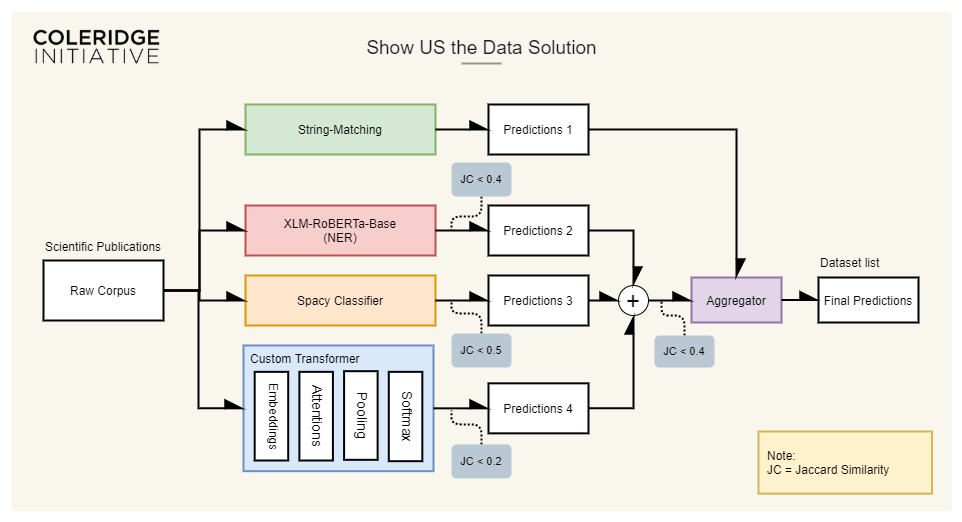The aim of this competition is to identify critical datasets used in scientific publications using NLP (Natural Language Processing) for automatic search. Utilizing the full text of scientific publications from numerous research areas gathered from CHORUS publisher members and other sources, you'll identify data sets that the publications' authors used in their work.
- This is our work, we DO NOT represent any organization
- There's no reproducibility guarantee for notebook which uses GPU and TPU
- Dataset and generated dataset falls under Coleridge Initiative Terms and Conditions which can be seen on Kaggle Datasets
Some of the notebook are run on different environment. We use Kaggle GPU on training the model and submitting the code to get public/private score.
| Environment Name | Description |
|---|---|
| Kaggle CPU | 2C/4T CPU, 16GB RAM |
| Kaggle GPU | 2C/4T CPU, 16GB RAM, Nvidia Tesla P100 |
| Kaggle TPU | 2C/4T CPU, 16GB RAM, TPU v3-8 |
| Filename | Link to Kaggle Kernel | Environment | Description |
|---|---|---|---|
| 100000-govt-datasets-api-json-to-df.ipynb | https://www.kaggle.com/mlconsult/100000-govt-datasets-api-json-to-df/ | Kaggle CPU | The external US Goverment's datasets scrapper by Ken Miller |
| web-scraping-for-bigger-govt-dataset-list.ipynb | https://www.kaggle.com/chienhsianghung/coleridge-additional-gov-datasets-22000popular | Kaggle CPU | The external US Goverment's datasets scrapper by Chien-Hsiang Hung |
| Filename | Link to Kaggle Kernel | Environment | Description |
|---|---|---|---|
| ci-create-train-df-with-ext-data.ipynb | https://www.kaggle.com/mfalfafa/ci-create-train-df-with-ext-data | Kaggle CPU | Identify the mention of datasets within scientific publications using literal prediction (filtered scrapped datasets) |
| ci-train-ext-dataset-v2.ipynb | https://www.kaggle.com/mfalfafa/ci-train-ext-dataset-v2/ | Kaggle CPU | Identify the mention of datasets within scientific publications using literal prediction (filtered scrapped datasets) |
| Filename | Link to Kaggle Kernel | Environment | Description |
|---|---|---|---|
| coleridge-spacy-model-training.ipynb | https://www.kaggle.com/mfalfafa/coleridge-spacy-model-training/ | Kaggle TPU | Create NLP model using Spacy classifier |
| coleridge-xlm-roberta-base-epoch-1-training.ipynb | https://www.kaggle.com/mfalfafa/coleridge-xlm-roberta-base-epoch-1-training/ | Kaggle GPU | Create NLP model for Named Entity Recognition (NER) task using XLM-RoBERTa-base as a pretrained model |
| sentence-level-analysis-with-transformer-v2.ipynb | https://www.kaggle.com/mfalfafa/sentence-level-analysis-with-transformer-v2 | Kaggle GPU | Create NLP model for sentence analysis task using multihead attention-based and MLP model |
| Filename | Link to Kaggle Kernel | Environment | Description |
|---|---|---|---|
| coleridge-initiative-final-inference.ipynb | https://www.kaggle.com/mfalfafa/coleridge-initiative-final-inference | Kaggle GPU | Final solution for prediction of mentioned datasets. This notebook used for submission |
Datasets and models are generated using scrapper and training notebooks. This datasets can be used to make quick submission using final-solution notebook.
| Scrapper/filter file | Generated dataset | Link to Kaggle datasets |
|---|---|---|
| 100000-govt-datasets-api-json-to-df.ipynb | 100000 + govt_datasets_api_json_to_df |
https://www.kaggle.com/mlconsult/100000-govt-datasets-api-json-to-df/data |
| 100000-govt-datasets-api-json-to-df.ipynb | bigger_govt_dataset_list |
https://www.kaggle.com/mlconsult/bigger-govt-dataset-list |
| web-scraping-for-bigger-govt-dataset-list.ipynb | Coleridge additional_gov_datasets_22000popular |
https://www.kaggle.com/chienhsianghung/coleridge-additional-gov-datasets-22000popular |
| ci-train-ext-dataset-v2.ipynb | CI_ext_datasets_found_in_train_v2 |
https://www.kaggle.com/mfalfafa/ci-ext-datasets-found-in-train-v2 |
| Training file | Generated model | Link to Kaggle datasets |
|---|---|---|
| coleridge-xlm-roberta-base-epoch-1-training.ipynb | NER model |
https://www.kaggle.com/mfalfafa/coleridge-xlm-roberta-base-epoch-1-training/data |
| coleridge-spacy-model-training.ipynb | Spacy Classifier model |
https://www.kaggle.com/mfalfafa/coleridge-spacy-classifier |
| sentence-level-analysis-with-transformer-v2.ipynb | Multihead attention-based model |
https://www.kaggle.com/mfalfafa/ci-transformers-model-v2 |
Dependency datasets are used for training the model and submitting the solution. For more details of required version of each python package/library could be seen on requirements.txt file.
| Dataset name | Description | Link to Kaggle datasets |
|---|---|---|
| Coleridge packages | Python libraries for datasets, seqeval, tokenizer and transformers | https://www.kaggle.com/tungmphung/coleridge-packages |
| Kaggle NER utils | Python file to train BERT model with Named Entity Recognition (NER) task | https://www.kaggle.com/tungmphung/kaggle-ner-utils |
| Notebook filename | Submission filename | Public LB | Private LB | rank |
|---|---|---|---|---|
| coleridge-initiative-final-inference.ipynb | submission.csv | 0.483 | 0.350 | top 3% |
This guide assume you have necessary files (full dataset provided by Coleridge Initiative and dependency datasets), move it to correct directory path and run it on Kaggle Notebook or another Jupyter Notebook environment.
- Run
100000-govt-datasets-api-json-to-df.ipynbandweb-scraping-for-bigger-govt-dataset-list.ipynb - Run
ci-create-train-df-with-ext-data.ipynb - Run
ci-train-ext-dataset-v2.ipynb - Run
coleridge-spacy-model-training.ipynb - Run
coleridge-xlm-roberta-base-epoch-1-training.ipynb - Run
sentence-level-analysis-with-transformer-v2.ipynb - Run
coleridge-initiative-final-inference.ipynb
